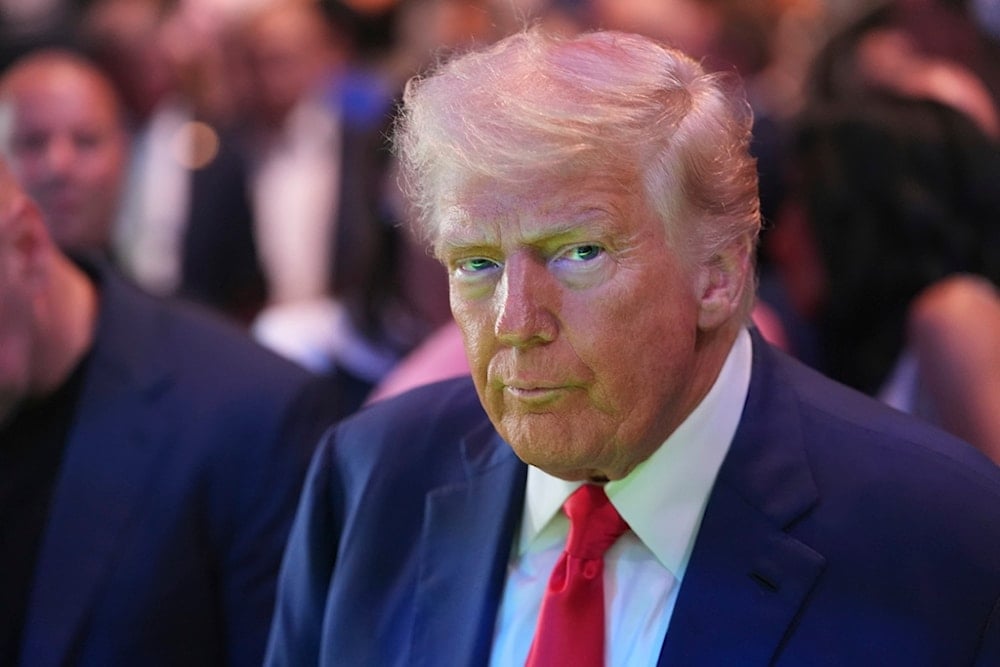US denies role in attacks on Iran, yet vows to defend 'Israel'
The Trump administration distances itself from Israeli strikes on Iran to protect US interests as nuclear talks with Tehran remain scheduled.
-

US President Donald Trump attends the UFC 316 mixed martial arts event Saturday, June 7, 2025, in Newark, New Jersey. (AP)
The Trump administration has sought to distance the United States from the Israeli occupation's latest aggression on Iran, warning Tehran not to retaliate against US interests as preparations continue for a sixth round of nuclear negotiations.
The Israeli entity claimed responsibility for striking alleged Iranian nuclear sites, stating the attacks aimed to halt Tehran’s supposed progress toward developing atomic weapons, although the attacks hit residential areas, targeting people in their sleep. The strikes come just days before the US and Iran are scheduled to resume nuclear talks, raising fears of broader regional escalation.
Despite the Israeli occupation’s decision to carry out unilateral strikes, US officials reiterated that Washington was not involved in the operation. Secretary of State Marco Rubio stated that while the US had been informed in advance, the attacks were carried out independently by “Israel".
"We are not involved in strikes against Iran, and our top priority is protecting American forces in the region," Rubio said in an official statement. "Israel advised us that they believe this action was necessary for its self-defense, Rubio added, although it was "Israel" that always initiated attacks against the Islamic Republic.
Hours before the Israeli airstrikes on Iran, US President Donald Trump had claimed hope for a diplomatic resolution. “A strike on Iran could very well happen,” he acknowledged, while reaffirming that Washington prefers negotiations to confrontation.
Yet, speaking to Fox News, Trump said he was aware "Israel" was going to conduct strikes on Iran before they happened and stressed that Tehran "cannot have a nuclear bomb," which Iran never sought.
Rubio warns Tehran, signals no support for Israeli retaliation
Rubio delivered a clear warning to Iran not to target American interests in response to the Israeli occupation's attack. His remarks came shortly after the United States ordered non-essential personnel to evacuate from several locations across the Middle East due to heightened security concerns.
"Let me be clear: Iran should not target US interests or personnel," Rubio said, without addressing whether Washington would defend "Israel" in the event of Iranian retaliation, departing from traditional US messaging that often emphasizes unwavering support for the Israeli regime. This support came directly from the US president himself.
“We will defend ourselves and defend Israel,” Trump said, as US Central Command (CENTCOM) is reportedly on high alert, with Trump confirming that American forces in the region are prepared to respond to any Iranian retaliatory attacks.
Friday's developments come at a sensitive moment. Yesterday, the International Atomic Energy Agency (IAEA) declared Iran in breach of its non-proliferation obligations for the first time in nearly two decades. Nevertheless, both Washington and Tehran confirmed that nuclear talks will proceed as planned in Oman on Sunday.
US special envoy Steve Witkoff is expected to meet Iranian Foreign Minister Abbas Araghchi, according to an American official who stated late Thursday, “We still intend to have talks Sunday.”
Trump–Netanyahu rift grows over Iran, Gaza
Recent US-Israeli tensions have been building over differing approaches to both Iran and Gaza. Trump has expressed dissatisfaction with Israeli Prime Minister Benjamin Netanyahu’s handling of the war on Gaza and his aggressive posture toward Tehran, reportedly urging Netanyahu to allow more food aid into the besieged Strip.
The two leaders spoke on Monday, with Trump later stating that Iran was their main topic of discussion. On Thursday, he hinted that an Israeli military move might be imminent on Iran, urging Iran to adopt a more flexible negotiating stance.
“Well, I’d love to avoid conflict. Iran’s going to have to negotiate a little tougher, meaning they’re going to have to give us some things that they’re not willing to give us right now," Trump said.
US lawmaker swims against the current
Concerns are also mounting in Congress. Senator Jack Reed, the top Democrat on the Senate Armed Services Committee, condemned the Israeli occupation’s strikes on Iran, accusing it of provoking further instability.
“Israel’s alarming decision to launch airstrikes on Iran is a reckless escalation that risks igniting regional violence,” Reed said in a statement.
As the Trump administration pushes ahead with its Iran diplomacy, the challenge now lies in containing the fallout of the Israeli regime’s military actions, without derailing talks that could reshape the nuclear landscape of the region.

 4 Min Read
4 Min Read









